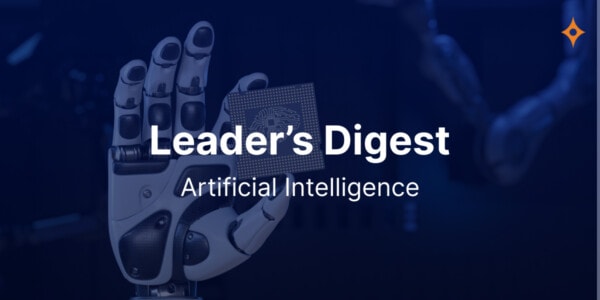16Nov2023
Explore the forefront of technological evolution with Nordic Business Forum 2023 speakers, where industry leaders delved into the heart of the AI Revolution. In the first episode of our exclusive video series, Behind the Keynotes, experts dissect the transformative force of AI, shedding light on its implications for leadership and business.
Technology is the biggest change maker right now, and we are living through multiple technological revolutions. The Internet Revolution took our lives online, and now we’re in the middle of the AI Revolution. Far beyond a mere tech trend, AI stands as a General Purpose Technology, akin to the transformative impact of the steam engine and the internet. This GPT (General Purpose Technology) will reshape economies and societies, becoming an assistive computing tool.
An Assistive Powerhouse
Futurist Amy Webb suggests envisioning AI as an assistive computing tool able to generate productivity and growth. Not unlike a word editor or a calculator, AI will assist us and shape our business and society.
However, AI should not be viewed as a general-purpose tool. To make the most out of AI, Mikko Hyppönen advises us to focus on core functions and find narrow applications for AI. Our job is to anticipate the effects of full-scale automation and the emergence of super-human intelligence while pinpointing the best applications for AI.
The Data Imperative
As a business leader, you need to take a deep look into your business to figure out what you have and what you will need in the future. Take a hard look at your data, and consider what you want to reveal to the external parties that provide these AI tools. Amy Webb highlights the importance of thorough data audits before considering investments and adoptions. Without a solid foundation of company data, AI’s effectiveness is compromised. Success with AI begins with an inward look at your data strategy.
The Most Intelligent Team Member
According to Mo Gawdat, artificial intelligence is the most intelligent team member you can recruit today. However, navigating the plethora of AI tools available requires strategic thinking. Mo suggests a portfolio approach, experimenting with various tools and embracing a trial-and-error mindset—a core principle in technological development.
The adoption of AI tools doesn’t come without challenges, either. Integration is key to successful AI adoption and requires trust and open communication. Leaders must foster trust among their teams, emphasizing the real purpose behind AI integration. Address critical issues, including job redefinition, power shifts, market disruptions, and existential AI risks.
A Sea of Risks and Opportunities
AI presents risks like deep fakes, automated operations, and malware. There’s a race between bad AI and good AI with threats posed by rogue generative models. Leaders must be discerning in their AI tool selection, balancing the competitive edge with ethical considerations. Embrace AI in a manner aligned with values, with a focus on detection and mitigation. Integrity is key in shaping a positive future with AI.
Want more inspiring leadership content? Join our Leader’s Digest Newsletter list to get your dose of monthly inspiration!

 by:
by: 
